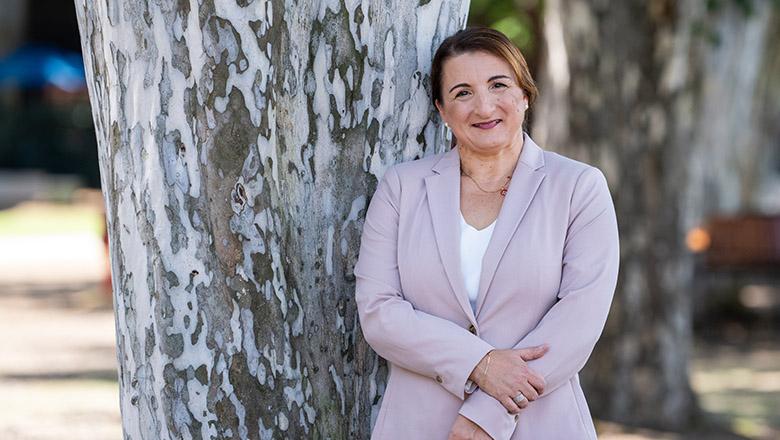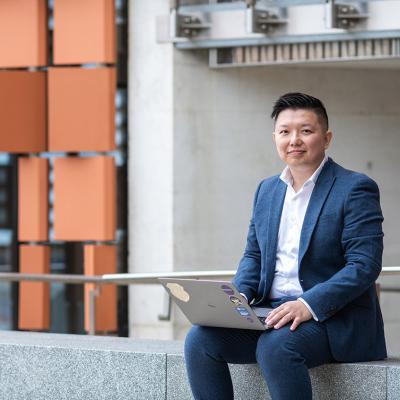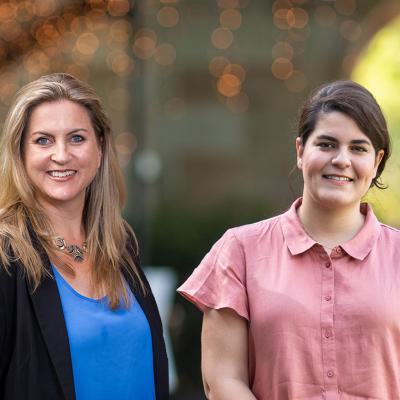Data, analytics and cyber security are some of the fastest growing and evolving fields in the job market today. This industry is well suited to individuals with a thirst for knowledge and an enthusiasm for lifelong learning.
Whether you want to study business analytics, cyber security, data science or bioinformatics, you may have some questions about what you can get out of these types of degrees and how they’ll help you progress your career.
We’ve spoken to a UQ postgraduate students and 2 alumni to help you find answers. Rae is studying a Master of Cyber Security, while Sandra Micallef and Kyara Ramraj both studied a Master of Business Analytics (delivered 100% online). They're all passionate about delving into the depths of data to gain insights that will both improve societies and protect people across the world.
Why study cyber security, data and analytics as a postgraduate at UQ? Read on to find out.
What inspired you to study cyber security or business analytics?
Rae: I aim to understand people’s motivations behind their actions so I can be involved in designing the best preventative and detective responses, as well as supporting victims.
I graduated with a bachelor’s degree in criminal justice at the end of 2022 and wanted to continue my studies with more of a focus in the cyber space.
Kyara: I knew I loved technology from a young age. I also knew that, with my personality, I needed to be people-facing as opposed to being a backend developer. Business analytics allowed me to experience the best of both – to be the bridge between stakeholders (people) and the technical team.
Sandra: I have over 25 years of experience in data management and wanted to advance my skills to more modern technologies.
“My children have now grown up and left home, so I wanted to re-invent myself and find something that I really enjoyed learning.”
How did you prepare for your postgraduate studies and did you need to make any changes to your lifestyle to accommodate it?
Rae: I looked into scholarships that could support my postgraduate studies and was fortunate to receive the ATSE: Elevate Scholarship for women and non-binary people in STEM.
Sandra: To adapt to the new studying routine, I decided to reduce my hours at work. I had never done online studying before, so it was a new experience, but it fitted really well with my lifestyle and I enjoy having the flexibility of doing the modules online, at a time that suits me.
Kyara: I aimed to complete my program in 2 years, which meant a full load. I handled these changes by managing the expectations of my family and friends, and setting clear boundaries between work hours and study hours.
I spent many hours researching the right option for me, and I reviewed the course descriptions in my selected program to ensure that these aligned with my career aspirations. I also spent time with my partner re-budgeting our finances. This was to ensure that I was able to fulfil both my tuition fee obligations and maintain my share of the household. Transparency and communication is paramount.
"Consider your circumstances when choosing how you spread out your courses. And ensure that you and your closest family are aligned on how your time and finances will be spent. Don't forget to allocate time to those who support you."
What to know before studying cyber security, data and analytics as a postgraduate
UQ is providing Commonwealth Supported Places (CSPs) for a number of postgraduate programs in data, analytics and cyber security in 2025. This means that your tuition fees could be significantly reduced. If you're looking for a Master of Data Science Commonwealth Supported Place program, or Master of Cyber Security Commonwealth Supported Place program, UQ might be the right university for you. Read on to find out what other data, analytics and cyber security postgrad programs have CSPs, or browse our full range of postgraduate CSP programs.

Rae’s advice to anyone thinking about starting postgraduate studies is to carefully consider finances and seek scholarship opportunities.
Which data, analytics and cyber security postgraduate courses and teachers have helped you the most?
Rae: All the teachers I have encountered in criminology have been incredibly supportive. The staff are dedicated to opening up opportunities for all the students – you just need to be brave enough to show your interest!
Sandra: I enjoyed the technical courses the most, where I learnt new programming languages such as Python and R, and the visualisation techniques in Power BI and Tableau. All my teachers were very helpful and supportive, and they were always available to listen to the students' feedback.
Kyara: The Responsible AI course stands out. This course probed me to think about the ethical and societal impacts of technological improvements. This challenged me in a way I have never been challenged before. I quite enjoyed it.
What’s your study load like as a business analytics postgraduate student?
Sandra: During my first year, I used to stress a lot about completing assignments and modules. Over time, I became better at managing my time to handle both while still carrying out other duties.
UQ's postgraduate programs offer various levels of flexibility to help you integrate study into your schedule. For example, the Master of Business Analytics is completed 100% online.
What’s it like to study cyber security as a postgrad, in comparison to your experience of undergraduate study?
Rae: My first semester of postgrad was a lot of what I was used to – attending 4 courses and completing a range of assessment pieces.
“Now, a lot more of my time is allocated to my research project that I designed. I’m really enjoying that freedom to dictate where my research goes.”
What kinds of Master of Business Analytics job opportunities are out there?
Sandra: I work in the School of Agriculture and Food Sustainability at UQ (Science Faculty). I work with academics and researchers and help them build tools for data collection, management and analysis, for specific research projects.
I am currently working on a project funded by the Bill and Melinda Gates Foundation which aims to reduce hunger and poverty in developing countries (SDG2) by helping their National Agriculture Centres improve their breeding programs of staple crops such as wheat, maize, cassava and rice.
A few of my daily duties include cleaning data received from our stakeholders, merging data in a repository, making changes to the data collection tool as suggested by the project leader, writing reports, updating Power BI dashboards, and coordinating data dissemination.
Kyara: I work at Shell Energy Australia as a senior business analyst. Each day is different. The best part of my day is defining a problem clearly with a stakeholder and ideating the solution with the team.
Discover other ways you could help businesses discover insights from their data with the knowledge you gain from a Master of Business Analytics.
So, is a master’s in business analytics worth it?
Kyara: I have been able to apply the knowledge, methodologies and approaches I have learnt to my day-to-day activities. This knowledge has helped me improve my confidence when delivering work and engaging stakeholders.
Sandra: The degree is helping me explore new ways to analyse and interpret the data I work with.
What I find most rewarding in my job is discovering new insights in the data we collect from our stakeholders and knowing that my work is helping improve the livelihoods of people in developing countries.

Sandra’s pro tip for Master of Business Analytics students is to attend the live online sessions of lectures when possible (rather than watching the recordings), as this is the best place to ask questions.
Why did you choose UQ for your postgraduate studies?
Rae: The interdisciplinary focus that involves students from a range of different areas.
Kyara: It was my dream to study at a prestigious university like UQ. So, when the opportunity arose, I grabbed it.
Does UQ offer the best postgraduate programs in data, analytics and cyber security?
Let’s take a look at the facts:
- UQ is #1 in Queensland for computer science, according to Times Higher Education World University Rankings 2026
- UQ is #1 in Queensland for computer science and information systems, according to QS World University Rankings by Subject 2025.
Plus, UQ postgrads earn an average 33% pay rise within 3 years of graduating.*
*Based on median salaries reported by domestic postgraduate coursework graduates employed full time and surveyed between 2023 and 2025 in the Graduate Outcomes Survey-Longitudinal by Quality Indicators for Learning and Teaching (QILT).
How can you study data, analytics and cyber security as a postgrad at UQ?
There are a variety of ways you can delve into the fascinating area of data, analytics and cyber security at UQ. Whether you want to find out how to use data to inform business decisions, protect people from cyber threats or get a broader perspective on data science, there’s a program at UQ to enhance your knowledge and build on your skills.
The great news is, most of our programs in this study area (including those listed below) offer Commonwealth Supported Places (CSPs) for study commencing in 2026, which dramatically reduces your tuition fees.
- Master of Cyber Security*
- Master of Business Analytics**
- Master of Data Science
- Master of Geographic Information Science*
*Also available to study as a graduate certificate or graduate diploma.
**Also available as a graduate certificate.
Not sure if you’re prepared to go back to study? Download our guide to getting postgrad-ready in 6 months.





